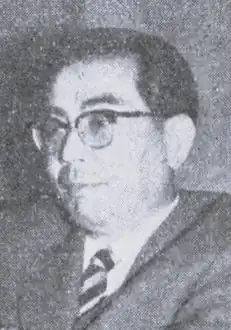Ken Harada (politician)
Ken Harada | |
|---|---|
原田 憲 | |
 Harada in 1962 | |
| Director-General of the Economic Planning Agency | |
| In office 27 December 1988 – 25 January 1989 | |
| Prime Minister | Noboru Takeshita |
| Preceded by | Eiichi Nakao |
| Succeeded by | Kōichirō Aino |
| Minister of Posts and Telecommunications | |
| In office 25 November 1973 – 11 November 1974 | |
| Prime Minister | Kakuei Tanaka |
| Preceded by | Chūji Kuno |
| Succeeded by | Toshio Kashima |
| Minister of Transport | |
| In office 30 November 1968 – 14 January 1970 | |
| Prime Minister | Eisaku Satō |
| Preceded by | Yasuhiro Nakasone |
| Succeeded by | Tomisaburō Hashimoto |
| Member of the House of Representatives | |
| In office 22 June 1980 – 27 September 1996 | |
| Preceded by | Mikio Ōmi |
| Succeeded by | Constituency abolished |
| Constituency | Osaka 3rd |
| In office 22 May 1958 – 7 September 1979 | |
| Preceded by | Ryōji Inoue |
| Succeeded by | Hiromu Murakami |
| Constituency | Osaka 3rd |
| In office 19 April 1953 – 24 January 1955 | |
| Preceded by | Mitsuzō Ōkawa |
| Succeeded by | Tatsunosuke Takasaki |
| Constituency | Osaka 3rd |
| In office 26 April 1947 – 23 December 1948 | |
| Preceded by | Constituency established |
| Succeeded by | Tadao Asaka |
| Constituency | Osaka 3rd |
| Personal details | |
| Born | 12 February 1919 Ikeda, Osaka, Japan |
| Died | 29 January 1997 (aged 77) Ikeda, Osaka, Japan |
| Political party | Liberal Democratic |
| Other political affiliations | JLP (1945–1948) DLP (1948–1950) LP (1950–1955) |
| Children | Kenji Harada |
| Alma mater | Meiji University |
Ken Harada (原田 憲, Harada Ken; February 12, 1919 – January 29, 1997) was a member of the Diet of Japan from the Liberal Democratic Party[1] until resigning his office on January 24, 1989[2] following alleged involvement in the Recruit scandal, where Harada admitted Recruit had given him donations, in the form of seasonal summer gifts,[3] for ten years.[4] While the donations were not illegal, they raised questions of political ethics which eventually led Harada to resign.[3] As a member of the Diet, Harada served as Minister of Economic Planning, and earned the close trust of Prime Minister Noboru Takeshita.[5] He was the third minister to resign over the scandal.[2] Harada had been appointed to direct the Ministry of Economic Planning only one month before his resignation.[6][7] After party officials had already placed him as the chair of a committee in charge of investigating the Recruit stock scandal,[8] where he had concluded that nothing illegal had taken place.[9] In 1992, Harada backed Keizō Obuchi as new leader of the Liberal Democratic Party.[10] Kōichirō Aino replaced Harada as Minister of Economic Planning.[3]
Scouting
Harada served as a member of the National Board of Governors of the Boy Scouts of Nippon and President of the Scout Parliamentary Caucus. In 1989, Harada was awarded the 200th Bronze Wolf, the only distinction of the World Organization of the Scout Movement, awarded by the World Scout Committee for exceptional services to world Scouting.[11][12] In 1985 he also received the highest distinction of the Scout Association of Japan, the Golden Pheasant Award.[13]
References
- ^ Vilaró (1989), 1.
- ^ a b Associated Press (Jan. 24, 1989), 5.
- ^ a b c Chira (1989).
- ^ Schoenberger (1989), 8.
- ^ United Press International (1989), 3.
- ^ Associated Press (Jan. 26, 1989), 5,
- ^ Hoshii (1993), 178.
- ^ Japan stock scandal (1989), 5.
- ^ Hartcher (1989), 9.
- ^ Hayes (2004), 110.
- ^ "List of recipients of the Bronze Wolf Award". scout.org. WOSM. Archived from the original on 2020-11-29. Retrieved 2019-05-01.
- ^ 出典: 日本連盟スカウティング誌(2008年3月号
- ^ 䝪䞊䜲䝇䜹䜴䝖日本連盟 きじ章受章者 [Recipient of the Golden Pheasant Award of the Scout Association of Japan] (PDF). Reinanzaka Scout Club (in Japanese). 2014-05-23. Archived from the original (PDF) on 2020-08-11.
Bibliography
- Associated Press (26 January 1989). "Takeshita: He'll stay, seek trust". The Register-Guard. Guard. Retrieved 14 September 2009.
- Associated Press (24 January 1989). "3rd Japan official resigns in stock scandal". Deseret News. Retrieved 14 September 2009.
- Chira, Susan (25 January 1989). "Scandal Fells Another Japanese Official". The New York Times. Retrieved 14 September 2009.
- Hartcher, Peter (25 January 1989). "Recruit scandal claims senior Cabinet Minister". The Sydney Morning Herald. Retrieved 14 September 2009.
- Hayes, Louis (2004). Introduction to Japanese Politics (illustrated ed.). M.E. Sharpe. ISBN 0-7656-1338-7. Retrieved 14 September 2009.
- Hoshii, Iwao (1993). Japan's Pseudo-Democracy. Routledge. ISBN 1-873410-07-7. Retrieved 14 September 2009.
- "Japan stock scandal: Third cabinet minister resigns". The Gainesville Sun. The New York Times Company. 25 January 1989. Retrieved 14 September 2009.
- Schoenberger, Karl (1 January 1989). "Fund-raising ethics". Manila Standard. Retrieved 14 September 2009.
- United Press International (13 February 1989). "More arrests made in stock scandal". Ellensburg Daily Record. Retrieved 14 September 2009.
- Vilaró, Ramón (25 January 1989). "El escándalo de Recruit se cobra otro ministro japonés: Dimite el titular de Planificación Económica". El País (in Spanish). Retrieved 14 September 2009.
- Dr. László Nagy, 250 Million Scouts, The World Scout Foundation and Dartnell Publishers, 1985, complete list through 1981
External links
- 17 Bronze Wolf Recipients from Japan
- "In Support of World Scouting" (PDF). Archived from the original (PDF) on 2009-03-27. Retrieved 2009-03-27.
- Full list of Japanese Bronze Wolf recipients
- Scout Association of Japan